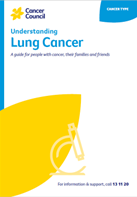- Home
- Lung cancer
- Managing symptoms
- Breathlessness
- Improving breathlessness at home
Improving breathlessness at home
It can be distressing to feel short of breath, but a range of simple strategies can help provide some relief from breathlessness at home.
Treat other conditionsLet your doctor know if you feel breathless. Conditions, such as anaemia, a lung infection, or chronic obstructive pulmonary disease may also make you feel short of breath, and these can often be treated. | |
Sleep more uprightUse a recliner chair or prop yourself up in bed to help you sleep in a more upright position. An occupational therapist may be able to recommend a special pillow for sleeping. | |
Ask about medicinesTalk to your doctor about medicines, such as a low dose of morphine, to ease breathlessness. It is important to keep any chest pain well controlled because pain may prevent you from breathing deeply. | |
Check if equipment could helpAsk your health care team about equipment to manage breathlessness. To improve your lung capacity, you can blow into a lightweight device called an incentive spirometer. You may be able to use an oxygen concentrator at home to deliver oxygen to your lungs, or a portable oxygen cylinder for outings. If you have a cough or wheeze, you may benefit from a nebuliser, a device that delivers medicine to your lungs. | |
Modify your movementSome types of gentle exercise can help but check with your doctor first. An exercise physiologist, physiotherapist or occupational therapist from your treatment centre can explain how to modify your activities to improve breathlessness. | |
Relax on a pillowRest your head and upper chest on a table with a pillow. Bend from your hips and keep your back straight. This helps to relax your breathing muscles. | |
Create a breezeUse a handheld fan to direct a cool stream of air across your face if you feel short of breath when not exerting yourself. You may also find it helpful to sit by an open window. | |
Find ways to relaxListen to a relaxation recording or learn other ways to relax. This can help you to control anxiety and breathe more easily. Some people find breathing exercises, acupuncture and meditation helpful. Listen to our Finding Calm During Cancer podcast episodes.For more on this, see Complementary therapies. |
→ READ MORE: Pain and lung cancer
Podcast: Meditation and Relaxation
Listen to more of our meditation and relaxation podcasts
More resources
A/Prof Brett Hughes, Senior Staff Specialist Medical Oncologist, Royal Brisbane and Women’s Hospital, The Prince Charles Hospital and The University of Queensland, QLD; Dr Brendan Dougherty, Respiratory and Sleep Medicine Specialist, Flinders Medical Centre, SA; Kim Greco, Nurse Consultant – Lung Cancer, Flinders Medical Centre, SA; Dr Susan Harden, Radiation Oncologist, Peter MacCallum Cancer Centre, VIC; A/Prof Rohit Joshi, Medical Oncologist, GenesisCare and Lyell McEwin Hospital, Director, Cancer Research SA; Kathlene Robson, 13 11 20 Consultant, Cancer Council ACT; Peter Spolc, Consumer; Nicole Taylor, Lung Cancer and Mesothelioma Cancer Specialist Nurse, Canberra Hospital, ACT; Rosemary Taylor, Consumer; A/Prof Gavin M Wright, Director of Surgical Oncology, St Vincent’s Hospital and Research and Education Lead – Lung Cancer, Victorian Comprehensive Cancer Centre, VIC.
View the Cancer Council NSW editorial policy.
View all publications or call 13 11 20 for free printed copies.



